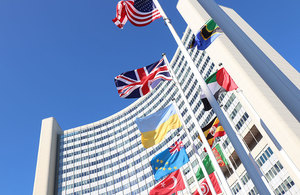UK Statement at Scientific and Technical Sub-committee of the Committee on the Peaceful Uses of Outer Space (COPUOS): Space debris.
Delivered by Jacob Geer, Head of Space Surveillance and Tracking, UK Space Agency, 8 February 2022.

Chair, Distinguished Delegates
The Delegation of the United Kingdom is pleased to have the opportunity to share with you the progress and developments we have made since the last meeting of this sub-committee.
In September of 2021, the UK published its National Space Strategy, the first time the UK government has brought together civil and defence space policy. The Strategy sets a bold vision for the UK’s space future, recognising the changing nature of the global space sector and the increasing strategic importance of space to the UK’s national interests. In particular it recognises the underpinning need to deliver a safe, sustainable and secure space environment.
The Strategy notes the growing risk posed by accidental collisions with space debris and sets out the UK’s intent to lead the global effort to make space more sustainable. In June this year, the G7 countries issued a statement recognising the growing hazard of space debris and committing to the safe and sustainable use of space to support humanity’s ambitions now and in the future. The UK also placed great importance on work of the Inter-Agency Debris Coordination Committee in developing a common understanding of the sustainable use of Earth orbit. We will continue to use the IADC work and their associated guidelines to inform our decision making processes.
Adherence to these guidelines will slow the proliferation of debris generation, but alone will not ensure protection to those satellites currently in orbit. In higher orbits, the current debris population will remain in place for centuries or longer, posing an ongoing risk to the satellites we are so reliant on.
That is why the UK is also delivering missions targeted to address the problem as it currently stands. To mitigate the risk from debris during a satellite’s operational mission, we must be able to predict and warn satellite operators of potential collisions in real time through space surveillance and tracking. The UK has been conducting space surveillance since 2008 and was a founding member of the EU’s Space Surveillance and Tracking capability in 2015. In recent years we have continued to develop our national capability to better track satellites and debris, and conduct analysis of satellite orbits and conjunction, fragmentation and re-entry events. We regularly share analysis and data with international partners on potential hazards. We continue to invest research and development funding into areas such as artificial intelligence, software development, novel optical sensing and others which are proposed by the UK’s vibrant academic and industry sectors. This year, we will roll out this service to commercial satellite operators licensed in the UK. The service will provide them with warnings when their satellites are at risk of collision, as well as the contextual information they need to make a safe decision about whether to manoeuvre. This analysis is conducted by our team of expert civil and military orbital analysts in the UK Space Operations Centre. From our research, we believe that this will support smaller satellite operators in particular, who may not have the resources to conduct this analysis themselves. We are proud that we are able to support our industry and international partners in this way to help achieve our common aim of maintaining an orbital environment that is safe and sustainable for all.
In addition, we need to take steps to not only manage but reduce the problem caused by debris. ESA and NASA studies have estimated that we can stabilise the Low Earth Orbit population by removing 5-10 pieces of debris per year. We are currently studying the feasibility of a UK-led commercial mission to remove multiple pieces of debris from orbit. From its operations centre in the UK, the company Astroscale’s ELSA-d mission is trialling new technology to capture and remove debris.
Through the European Space Agency, the UK is an investor in space safety including substantial commitments to active debris removal and in-orbit servicing through the ADRIOS programme. Planned for 2025, Clearspace-1 is the first space mission exclusively dedicated to the removal of an existing object in orbit, and is an important step towards a cleaner space environment.
The UK aims to be at the forefront of modern regulation for novel space activities, while keeping space sustainable, safe, and secure. We will explore advanced in orbit servicing, refuelling and assembly technologies as well as debris removal to ensure the UK is ready to grasp the opportunities of the future space economy. The UK recognises the growing problem of space debris and is committed to playing our part in the global effort to maintain the safe use of the orbits on which we all rely. There is a growing interest in space debris among the UK public, who are becoming more aware of their dependence on satellite data. The interest from the public, and indeed the British Royal Family who have recently heard from me and others on the threat of debris, shows the growing momentum for action in the UK.
We are pleased that London will host the Secure World Foundation’s Space Sustainability Summit in June, later this year, and aim to use this event to deepen our efforts to make space sustainable. I hope to see many of you at the event, in person if we can.
Thank you Chair and distinguished delegates.